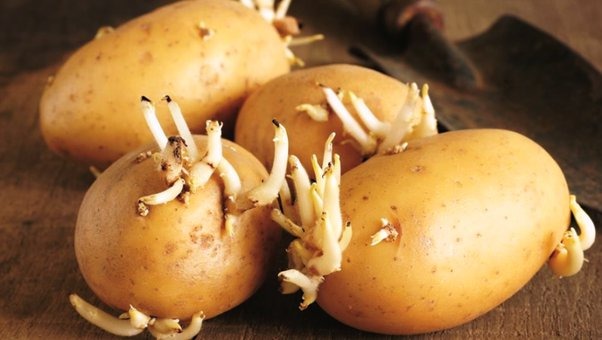While rushing to make dinner, you reach into your vegetable drawer and pull out a sack of sprouted potatoes. You had planned to make roast beef with mashed potatoes, but now you’re wondering if these grown potatoes are safe to eat.
It’s not difficult to identify a sprouted potato; it has white bulges bursting out of it. This is not an alien parasite disguised as food. It is a normal part of the potato plant’s growth cycle.
Wild potato plants rely on tubers to survive from year to year. Although most gardeners plant Solanum tuberosum as an annual crop, in its natural habitat, this species grows perennially. The plant dies off on the Andes’ harsh mountainsides when the weather becomes too dry and cold. It stores energy as starch in underground potatoes, which shoots up when the conditions are warm and moist.
Similarly, potatoes stored in kitchen pantries may detect summery conditions and grow sprouts.
Under certain conditions, potatoes may also turn green. Potatoes can produce chlorophyll, which makes them appear green when exposed to light. However, this differs from sprouting, although potatoes can grow and have a greenish hue simultaneously.
Sprouted potatoes can be poisonous because the sprouts on the tubers contain solanine, which is toxic to humans. It can cause nausea, abdominal pain, and diarrhea, but it does not cause epidermal infections.
According to Smithsonian Magazine, all parts of wild potato plants are poisonous. This is a defense mechanism against insects, animals, and humans who may want to consume their green fronds.
Fresh potatoes only last a few months.
Potatoes are prone to sprouting, turning green, and rotting, so Michigan State University recommends storing them in a dark, dry place at 45-50 F, slightly warmer than a fridge. Moisture and warmth can cause potatoes to sprout, while exposure to light can turn them green. They can last up to a month if stored in the right conditions.
Commercial growers often spray potatoes with CIPC to suppress sprouting to extend their shelf life, but the impact of this chemical on consumer health is unclear. Some consumers prefer to buy organic potatoes to avoid this issue, but potatoes are likely to sprout more quickly without treatment.
Can pets eat sprouted potatoes?
If you have backyard chickens or a pet rabbit, you may have given them vegetable scraps before. However, sprouted potatoes are different. According to Petco, rabbits have difficulty digesting potatoes, so it’s best not to feed them to your bunny.
The University of Wisconsin suggests using cull potatoes to feed livestock to reduce food waste. Potatoes are a great addition to a mixed ration but should never be fed to cattle on their own due to their high energy content. It is important to note that green and sprouted potatoes should not be fed to cattle as solanine is toxic to them.
According to Penn State University, sprouted potatoes can be used in recipes with proper preparation. Freezing whole, fresh, or baked potatoes may not be delicious, but other alternatives exist. Preparing large batches of mashed or scalloped potatoes and freezing them can result in quick and delicious meals when you’re short on time. Freezing cooked potatoes does not significantly affect their taste or texture. Another option is to cut potatoes into fries, pre-bake them, and freeze them. This prevents food waste and simplifies meal prep.
Sprouted potatoes are safe to consume, but they must be considered safe before being consumed. To avoid poisoning your family with mashed potatoes, remove the leaves, flowers, green skin, eyes, and sprouts, as these contain the highest concentration of solanine. The potato’s white body has the lowest solanine concentration and is safe to consume. Remember to cut out the eyes and sprouts before preparing your mashed potatoes.
According to them , sprouted potatoes are a significant food waste source. Cooks often discard sprouted potatoes instead of removing the growths, resulting in approximately £230 million worth of potatoes rotting in landfills. Taking a few extra minutes to remove the sprouts can significantly reduce food waste and benefit the planet.

 Discuss
More news
Discuss
More news


